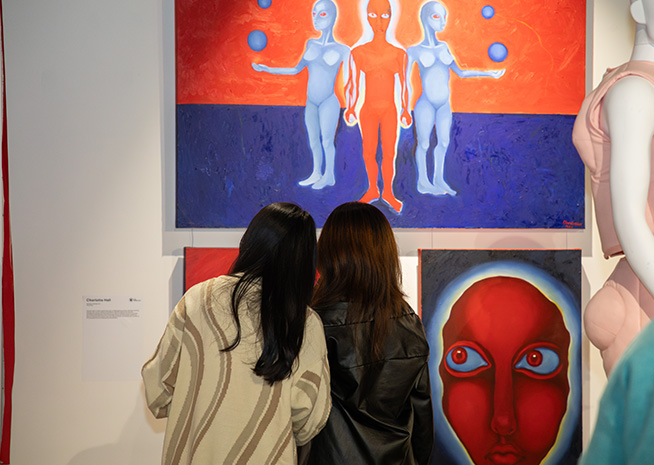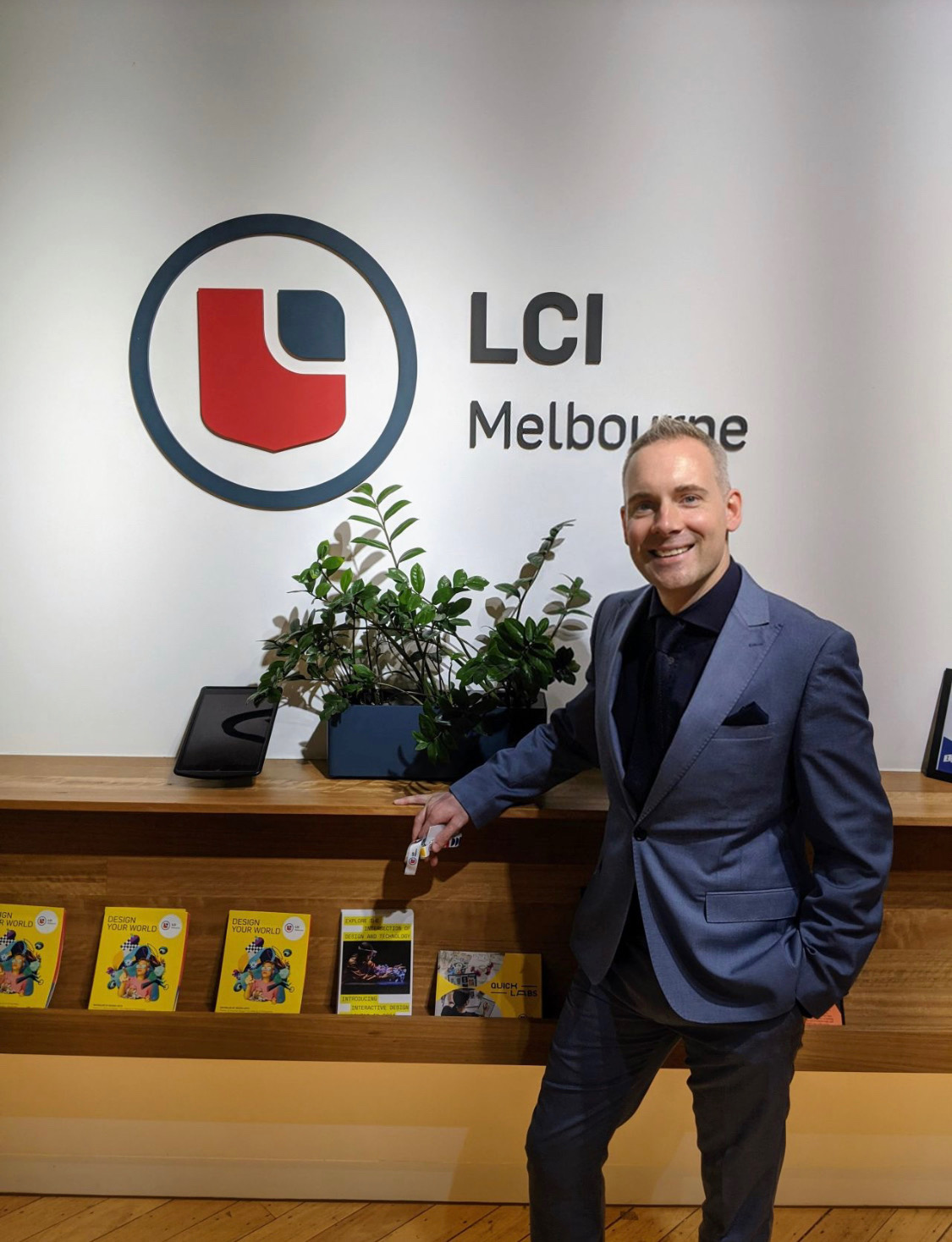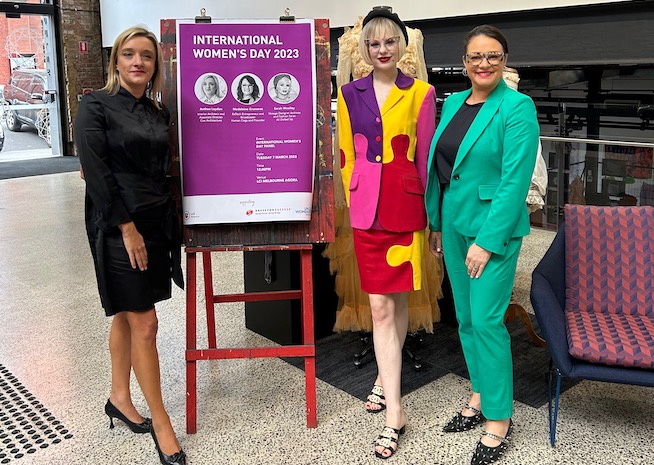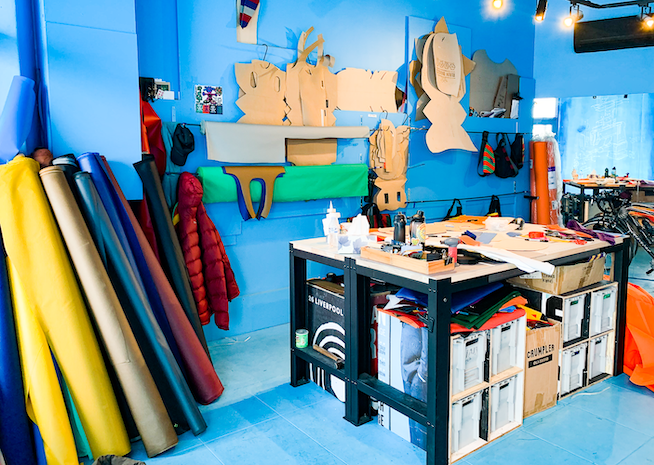Catch up with our graduate Samuele Tomasulo, winner of the Australia Post Prize People's Choice Award!
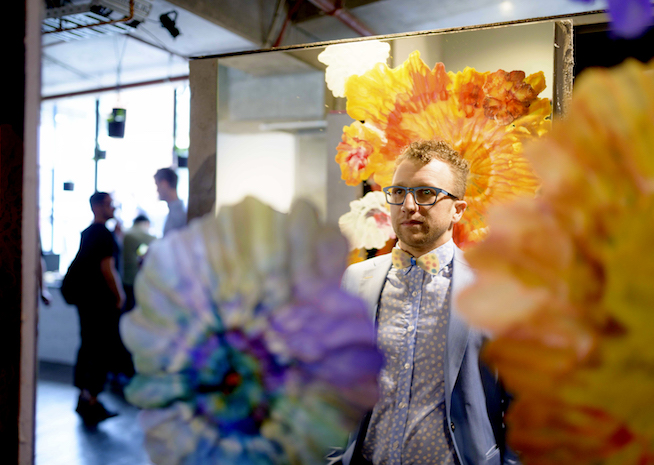
After a quick haircut up the street in Collingwood, we got to catch up with LCI Melbourne graduate, Samuele Tomasulo, to discuss achievements, childhood imaginary universes and his design ethos.
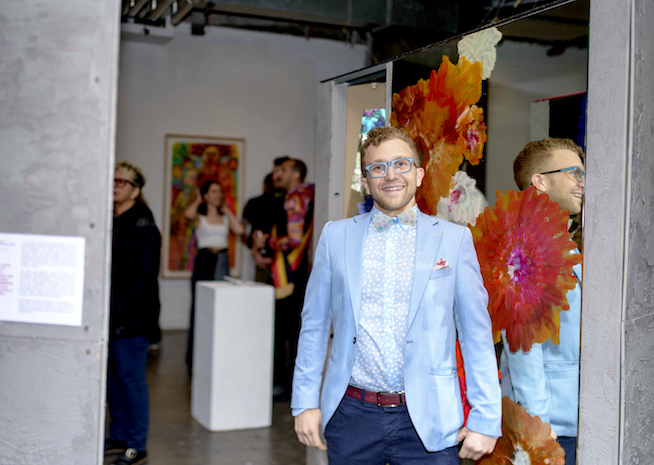
Congratulations on featuring as a finalist in the Midsumma Australia Exhibition; and for winning their Australia Post Prize People's Choice Award! What has the experience been like?
It’s been pretty good, there were a lot of obstacles and struggles but it was nice to have the validation. Getting an award was so interesting, so many artists came to the opening and it was very diverse. There were so many queer artists and a spectrum of gender identities and sexualities, which I love.
After the voting, a lot of the artists came to tell me they voted for my work because it had touched them. If I had known we could have voted I would have been involved, I probably would have voted for Shelly. She made work about being, deaf, lesbian, and a woman. All of these alone are very isolating and I really related to her with that.
My work, was also about the isolation of having HIV, and how people make you feel with certain phrases. The validation of it (the award) was important, because artists often don’t get the recognition they deserve.
I had a point right out of graduation where I was thinking what job will I do? Then I was like, no, I have to do something with people, to make a difference.
How did you build up such a rich visual language, and what does it refer to personally?
When I really started painting, it came from an imaginary universe I had as a child.
My paintings were trying to form the language I had for that universe, and as a kid I went through a bajillion ways to come up with this language. I had tried writing down a coded language, like an alphabet.
Every time I did it I was like, this doesn’t make sense because this isn’t how they speak.
I kept trying to explain this to everybody but no one could really understand, it was a visual language, colours and depths of shapes with colour. The feeling you get (from the colours) was the language!
I got this from something I later found out was, synaesthesia. When I learned I had synaesthesia and that I was seeing these colours and feeling them, I learned why not everyone could feel them like I could.
I feel like emotions are the basis for all of the inspiration in my art. I am really driven by the thought behind things, like how we put things together. I also really care about the people around me, I want to see a world better with less struggles.
“Emotions and intellect together really drive my work”
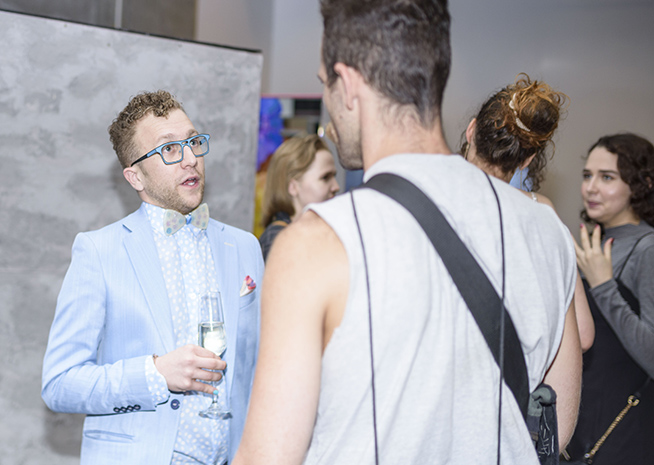
What are the inspirations for your work?
My next inspiration is sound I suppose. Sound, because I feel our senses are very specific. We remember things like smell the most, a single drop of a scent can bring back the most vivid memory you’ve ever had from your past.
Sound, especially scripted sound like words, is very manipulated to specific situations.
I discovered this with a project from a couple of years ago. For my piece, I took texts from a long-distance relationship with a guy in Auckland. I took every text he sent, put them through a robotic voice and added pauses, as I slowed down texting him back, I had longer pauses. I mounted the sound behind a silver, monochromatic painting in a dimly lit empty gallery room. Everyone who walked in felt the voice, felt the power. It was probably one of the most powerful pieces I had done in Chicago.
When I came to LCI Melbourne, Michelle (Visual Arts mentor) asked us to do work on the body, I did a sound piece about coming out of the closet. It was the first time I felt my work had this power, it was able to place people. The things I had done prior, it felt like they were just looked over, so sound was the connector. It was the missing piece of the puzzle in a sense.
With Brigit (LCI Melbourne mentor)’s class, in the following Trimester I did a piece on HIV. For the first time in my entire life, I told a room full of people I had HIV, you know the whole group. I don’t think I cried in front of the class, but I definitely cried when I got home.
“Why am I crying? Like I’m sick, this isn’t my fault”
I’ve always been very driven by monuments. I want all of my work to have these structural, monumental facets to them, because emotions are monumental.
We are shattered mirrors, each shard of glass that we’re putting together, every single day is an emotion. We’re born as beautiful mirrors that we can look into and absorb all of the sites around us, but then as we grow up it shatters.
The mirror just shatters. But we have to put it back together.
Those are my three points of inspiration. It’s important this story is told, it’s also a big thing that LCI helped with. I wouldn’t have been comfortable to explore this in another situation; I’ve talked about how LCI feels like a family and it really is.
I’ve gone to four different universities, in four different countries, speaking two different languages, on three different continents. So, I have a pretty good grasp of how higher education goes.
The education I got is really important, because I became an artist at LCI.
“LCI taught me how to be a professional and a better human too”
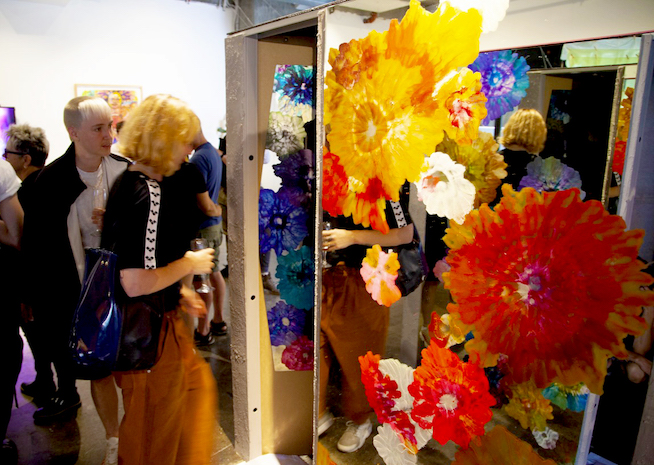
What has it been like with your artistic progression? From Professional Artist, to student and back again?
I came to LCI super arrogant, I was like “I’m a professional artist already so you can sit back and let me have my degree.” I quickly learned that wasn’t the case. When I was a professional artist, I was selling my art and living off my paintings. There was a lot of struggle in that and a lot of self-development, so after that career and coming here I thought I was already fully developed.
I held the mind-set that you develop, then you’re an adult and you’re going. I wasn’t aware at that point that you never stop developing.
Usually, I’ve found teachers react to arrogance with arrogance. But LCI was different, the mentors were studying us, learning what drives us, makes us tick and helps us grow.
“They lift us up in a way that is really unbelievable. They show us what we can become and I love that”
After I dropped the arrogance, actually started doing my work and listening to the people around me; I started the sound pieces and experimenting a little bit more.
When I started with my tent work, it looked great, just like how I pictured it. Brigit made that happen. They don’t do it for you, they show you how to do it, they inspire and build you up to the next step.
It’s incredible, it blows my mind.
The piece I won the award for is an updated version of my grad show work. I consider it a newer work but it’s the same structure.
“I realised this work doesn’t need to sit in a classroom, it needs to be elsewhere”
I applied for the competition, because I wanted it to go somewhere. I got in, and I won!
How do you think your journey has been affected by our mentors here at LCI?
Every single teacher in this school has changed my life and mentored me in a specific way for specific fields.
Carlo (LCI Melbourne mentor) has completely changed my life and how I deal with myself in a business sense, I see jobs in places that I never did before. I walk into places now and I think maybe I can get a design job, I’ve even done it a few times. Carlo gave me that power.
Max (LCI Melbourne mentor) insanely just dug into my brain and ripped stuff out. His classes have been some of my favourites. I’m inspired by intellect, the brain of it all and I feel like Max’s classes always talk to that. Whatever the task is he wants you to go into the deepest details of every little section.
Brigit has inspired me to make things that are way out of what I think I can do. I made my first structure with her, that gave me the power to do these projects. Michelle has shown me how to finish everything, which is something I’ve never been good at. I mean, I’m 27 and just got a degree, I’ve basically been a student for the last eight years.
Michael (LCI Melbourne mentor), and his way of teaching is so funky. In a way that, I’m inspired to follow in the footsteps of all of the teachers here. Barry (LCI Melbourne mentor) has really helped me dig into the past, and pull it up to now. Michelle Soldatos (LCI Melbourne mentor) has taught me how to use adobe. I can’t even begin to explain how crazy that is.
Every teacher I’ve had here has affected me in a different magical way. They are mentors, this isn’t a university of classrooms, it’s an institute of apprenticeships.
“These are the master artists and designers”
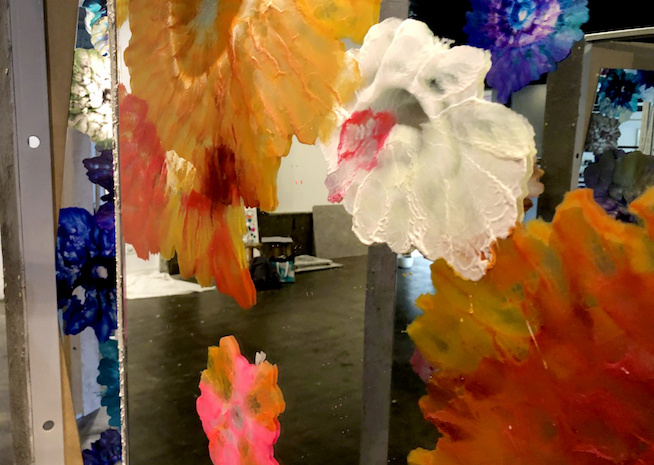
You’ve been so involved in LCI’s community, what has kept you coming back?
When I was a student here, I was super involved because there were a lot of things I needed and I wanted to make happen.
With the gay club and the international student association, they needed to be there for people who wanted to go there. There were a lot of students that did come to me for help.
“I think that it gave me happiness to be there for other students”
At LCIM they know, they can see when something is wrong and they do a good job of that. It’s a safe space here, and it’s family.
I’m at a transitional point in my life, I’m a little scared, nervous and lost. Being back here makes me feel safe and every time I come here, I am working on something.
Any advice for how LCI students can make the best out of their time here?
Yes! So much! It doesn’t matter how cool you think you are, drop that at the door. Come into your classes as a sponge ready to learn. That’s why you’re in school.
You don’t go to school to show off, you go to school to learn. When your mentors give you suggestions, listen and make it work. You don’t have to blow your budget, change your materials to achieve the end result.
Allowing yourself to be pushed and developing here is the difference between being artistic and being an artist.
When your teacher suggests you, “expand on this” or “make a million of these”, what they are saying is your work is great, but you can take it further. You’re in a safe space to experiment, and explore, if you try and screw up, it's fine.
“You can’t fail if you’re doing the work”
The only failure comes from not trying things or doing the work. This is a place to push the boundaries, that’s my advice. Also, be vulnerable, vulnerability is a super power.
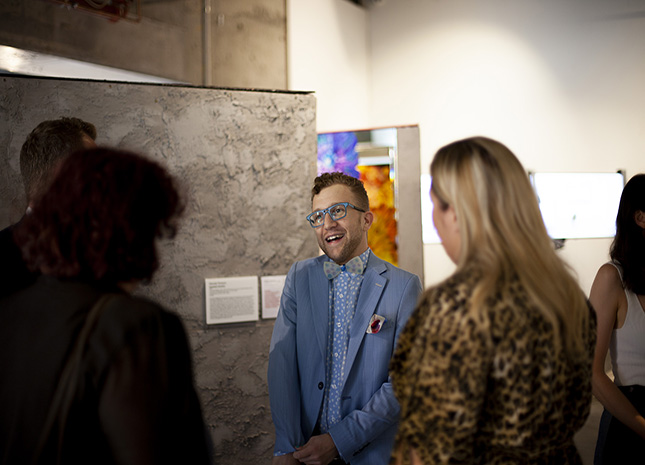
What’s next for you?
I want to expand on what I did with the award, working with emotional intelligence.
My work has always been emotional to me, but for others it’s been pretty to look at and confronting to experience. The next stage is for it to still be confronting, but it helps more people.
I’d like to run workshops and do talks with different groups about emotion. I want to show the behind the scenes of my art, artists have really interesting processes.
I want to bring people together and help people going through emotional struggles. Especially the LGBTQI+ community and people living with HIV. I want to create, help and support others understand themselves in safe spaces, and become a teacher to pay for all of that!
“I want to give more people opportunities through art”
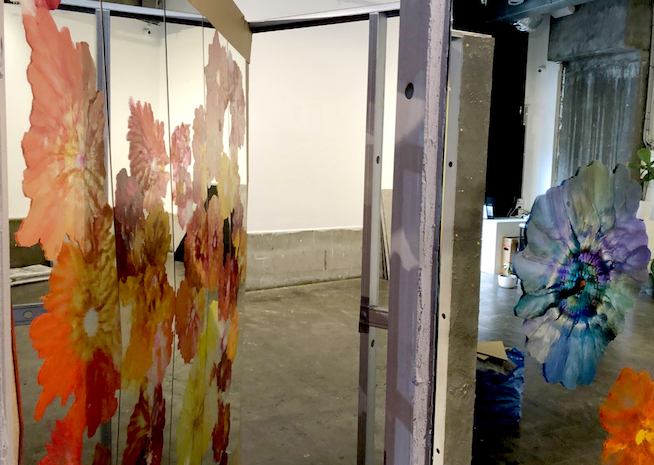 Photo credits: Eugene Howard and Tanya McCulloch
Photo credits: Eugene Howard and Tanya McCulloch

